When I ask clients which part of raising a puppy they struggle with the most, they don’t say house training or crate training. Nope. Instead, the universal answer seems to be the puppy biting phase!
To watch on Youtube, click here!
I get it: Puppy teeth are SHARP and those bites hurt. Your puppy isn’t evil or aggressive though (even if they seem like a rabid monster sometimes). It’s a normal phase they go through as they’re teething and learning appropriate ways to use their mouths. However, it can become a behaviour that lasts if it’s not properly handled!
It’s normal for new puppy parents to struggle with the biting. Puppies are adorable, but it can be hard (especially for kids!) to bond with something that keeps hurting you.
In this blog I want to provide a complete guide to managing puppy biting!
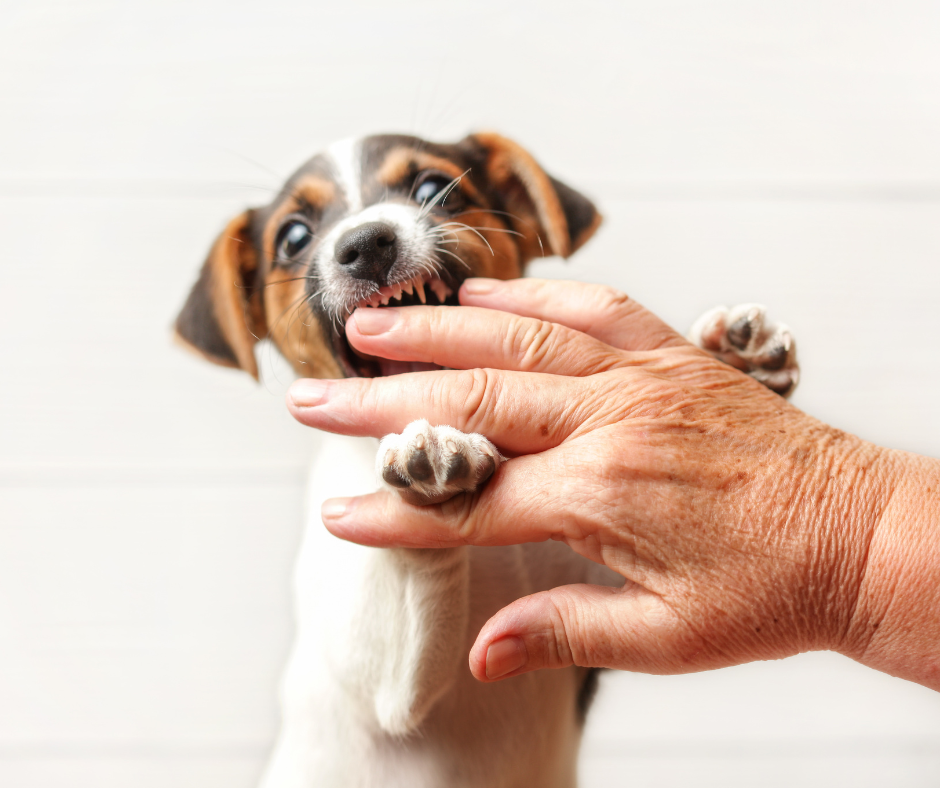
We’re going to cover:
- WHY do puppies bite so much?
- What is puppy teething?
- How to prevent your puppy from getting bitey
- Two rules I encourage you to follow to prevent puppy biting
- Training: My three strikes rule for teaching your puppy not to bite you
Important: Please keep in mind that your puppy is also going through an impressionable fear period while they’re teething & exploring. Using any aversive techniques such as yelling at the puppy, smacking their nose, pinning them, or holding their mouth shut can create fear & aggression in your puppy and make them hand shy. The most common body part for a dog to bite is the hand, and dogs often bite due to discomfort or fear. Typical puppy biting is over by ~ 6 months of age; don’t create a lifelong issue by using aversive training on a young puppy!
Why does my puppy bite?
Let’s start with WHY your puppy bites before we discuss what to do about it.
All puppies bite. During the teething process its normal for puppies to have moments where they’re complete little monsters. I want to reassure you that this is NORMAL!
Your puppy isn’t being aggressive or “bad”. They simply don’t understand what’s appropriate/inappropriate to chew yet, and their mouth is uncomfortable due to teething.
By nature, dogs are curious animals who want to interact with their world. However, the only way for a puppy to grab anything is with their mouth. For dogs, their mouths are like our hands!
Imagine expecting a toddler to naturally understand what they “shouldn’t grab” and you’ll understand why only biting “appropriate things” is an impossible expectation to have for a young, untrained puppy.
However, just like toddlers can be shown what is & isn’t ok to grab, puppies can also learn what’s appropriate to put in their mouth.
Instead of teaching your puppy not to use their mouth, we want to teach them what they’re supposed to mouth.
What is puppy teething?
Puppy teething is what we commonly call the process up puppies getting their first & second sets of teeth.
Puppy teething occurs in three stages:
- Milk teeth (or “deciduous teeth”) come in
- Milk teeth (deciduous teeth) fall out
- Permanent teeth grow in
Let’s discuss the teething timeline in a bit more detail because it’s important! Understanding the timeline will help you to be prepared for each stage and appreciate WHY your puppy is biting so much.
First: What’s the difference between milk & permanent teeth?
The first 28 teeth that your puppy gets are called deciduous (meant to fall out) teeth. They’re commonly referred to as “milk teeth” because the sharpness of them signals to mom that it’s time to start weaning the puppy. This encourages the puppy to start eating solid food!
Eventually your puppy will get their 42 permanent teeth. Once all milk teeth have fallen out & permanent teeth are in (typically by ~ 6 months of age) the puppy teething stage is considered complete.
A visual diagram of the puppy teething timeline:
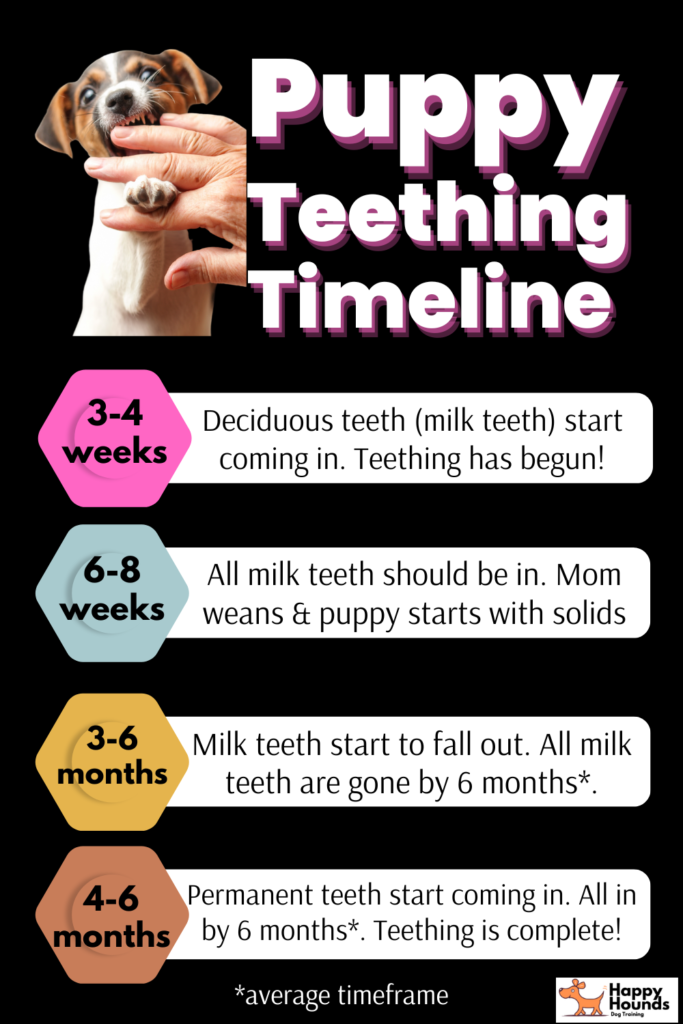
How to prevent puppy biting:
There are two main things that are going to make puppy biting way worse:
- Inadequate sleep
- Inadequate access to proper chewing items!
First- let’s discuss sleep.
Puppies require 18-20 hours of sleep per day! Most people greatly underestimate their puppies sleep requirements and that can lead to many issues. Puppies go through dramatically fast physical & mental development and need adequate rest during that time.
An overtired puppy is also much more likely to bite, a lot. If you’re struggling with puppy biting, the first thing I want you to consider is whether your puppy is getting enough rest.
Nobody is at their best when they’re overtired. That includes your puppy! Think of them like an overtired toddler; it’s not going to be a good time!
Next: It’s important to make sure your puppy has access to enjoyable chewing items.
I like to tell clients to think of puppies undirected biting like a battery: Each day, your puppy is waking up “fully charged” to chew. There’s an amount they NEED to chew each day simply because they’re a puppy.
Your goal should be to drain that “chewing battery” everyday to prevent them from taking their need to chew out on you, your clothes, your furniture, or other undesirable options!
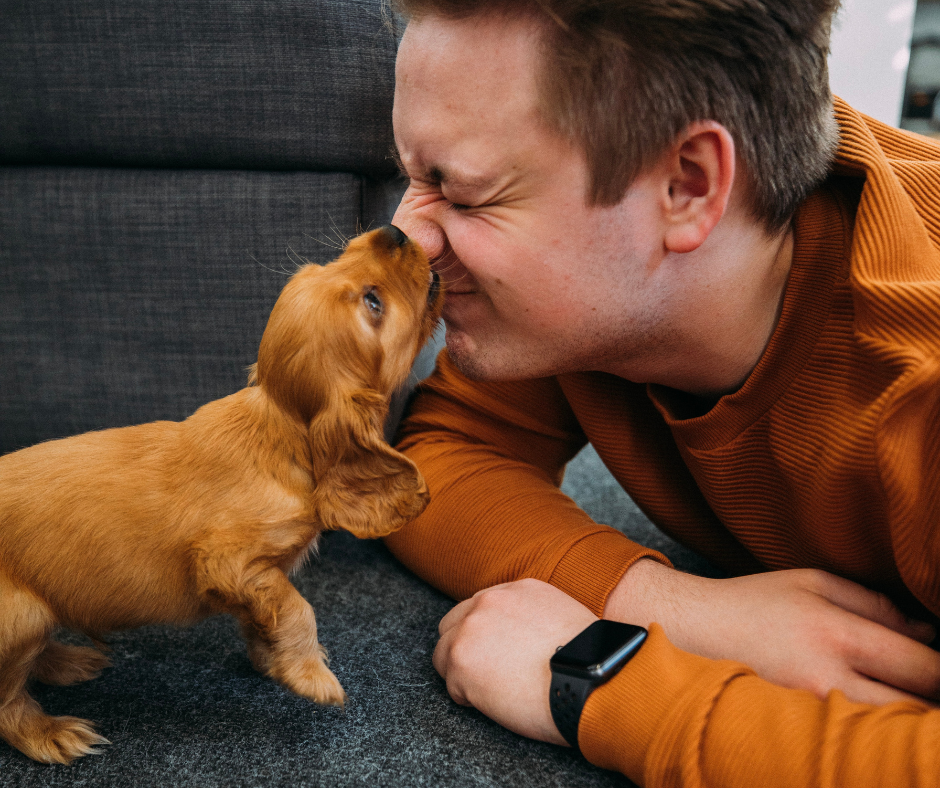
Plastic chewing toys designed for puppies are ok, but you’ll often find that they don’t hold a puppies attention for long. To really drain that “chewing battery” you’ll need to provide high value options that will encourage your puppy to chew.
Make sure you are offering safe chewing options however!
I suggest avoiding rawhide & bones/antlers due to the risk of intestinal blockage and cracked teeth. My three preferred chewing options are: yak chews, bully sticks, or stuffed & frozen Kongs (the cold can also be soothing for their gums during teething; I personally just stuff them with wet dog food but many people make their own blends!).
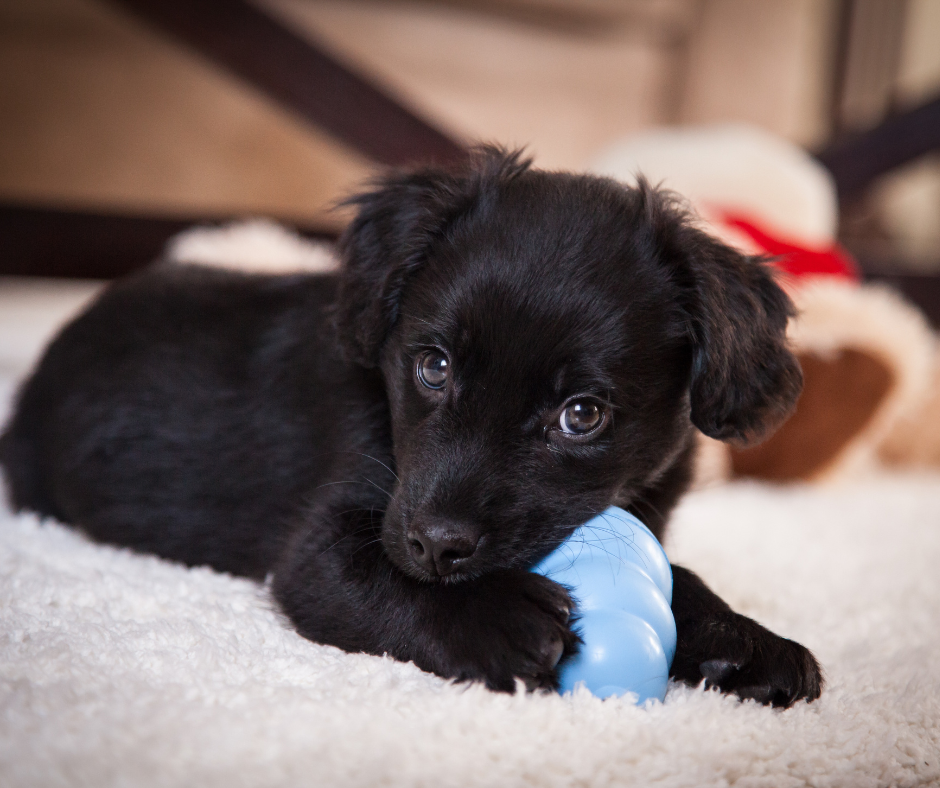
Two rules I encourage YOU to follow to prevent puppy biting:
- Don’t go in empty-handed
- Don’t purposely make your hands a target
First: Don’t approach your puppy empty-handed!
This sounds extreme, but it works.
During the puppy teething phase you can safely assume that if your puppy is awake, they will likely have something in their mouth. If it’s not something appropriate, it’s probably going to be you.
I strongly encourage you to make sure (or bring) appropriate chewing items to each interaction with your puppy! That could be a toy, chewie, or kong. Any chewing item is ok, just make sure that there’s something appropriate for your puppy to mouth & that it’s nearby!
Second: Don’t purposely make your hands a target!
I’ve had clients vent to me about their puppies biting and in the same session they’re on the floor dancing their hands around for their puppy to chase.
Don’t do that!
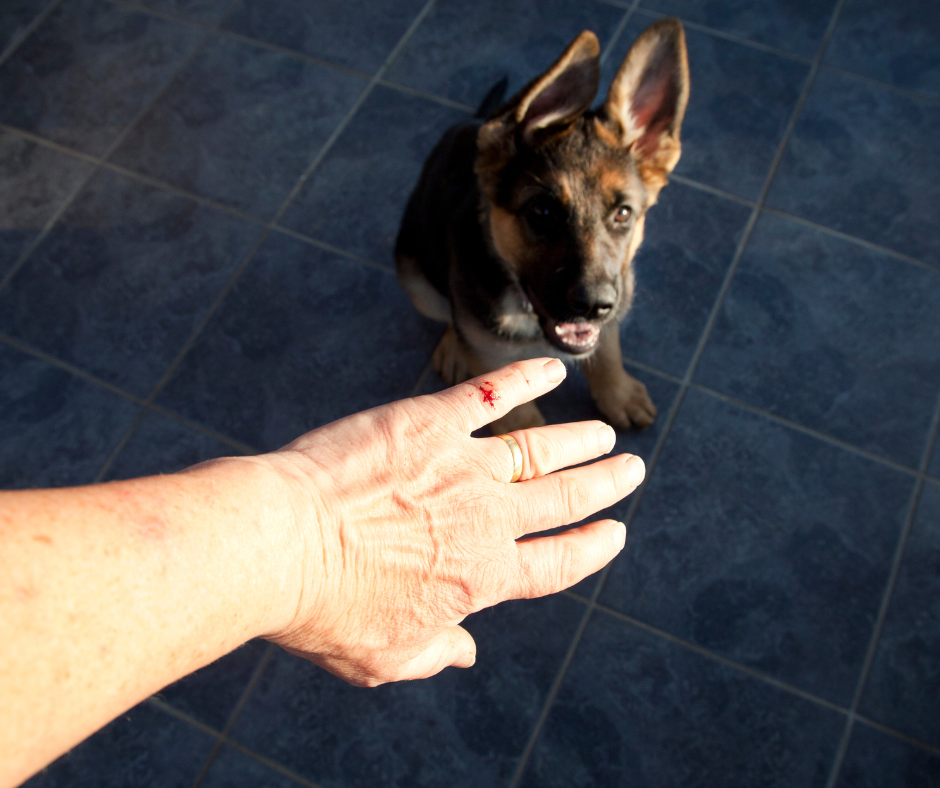
All dogs have some level of prey drive (any behaviour related to chasing, hunting, or capturing prey). The strength of your dogs prey drive will vary depending on breed & personality, but it will be there. It’s part of being a dog! Most of the games we play with our dogs mimic the predatory sequence in some way. Dogs find it very enriching to use their natural desire to chase & hunt!
However, If you don’t want your hands/skin to be a target *PLEASE* don’t make them into one as a game. It’s not fair to expect your puppy to know when they can hunt your hands and when they can’t!
By treating your hands like a fun target, you’re reinforcing the behaviour of your puppy pursuing them with their teeth. Instead, hold a toy while you play!
I also strongly encourage playing with toys that have a handle or using a flirt pole to further decrease the chances of your hands being nipped. Too small of toys or ones without a handle can result in your puppy accidentally grabbing you when they didn’t intend to.
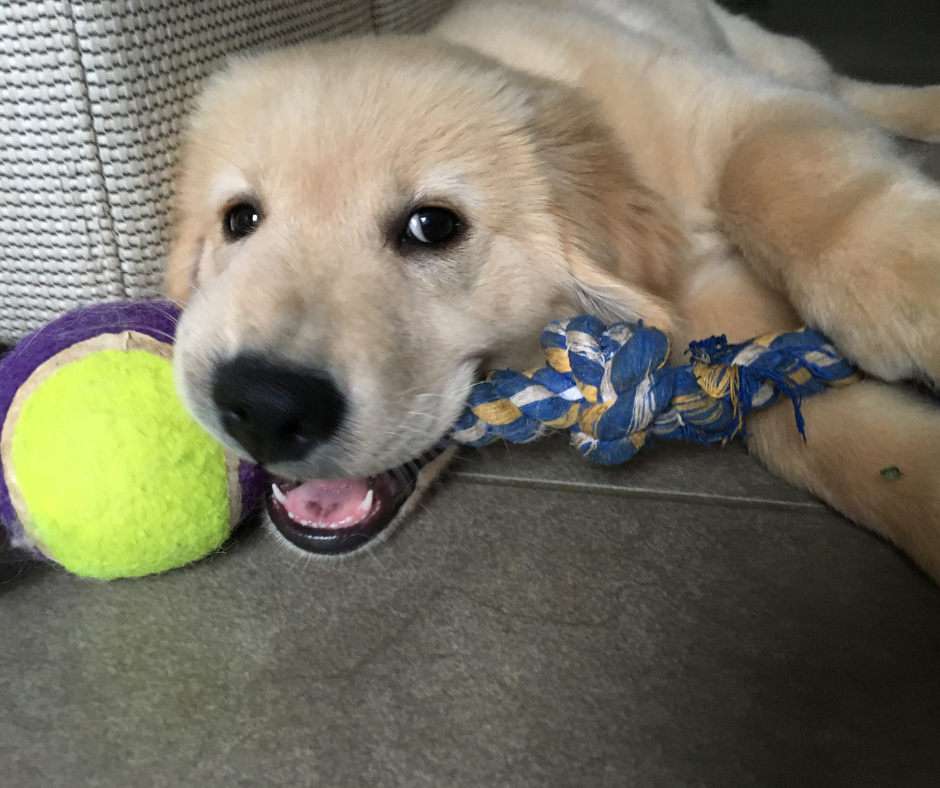
What to do when your puppy DOES bite you
I wanted to first explain why your puppy will bite & how to prevent the most common mistakes I see puppy owners make.
However, even if you do all of that perfectly, there will still be moments when your puppy will bite you. While they’re learning what is appropriate to mouth they are going to make mistakes!
However, it is important to signal to your puppy that you aren’t ok with being a chew toy. Human skin isn’t for biting! When you get a puppy it’s your job to create fair and consistent boundaries for unwanted behaviours.
I use what I call a “three strikes rule” for puppy biting.
IMPORTANT: I recommend following this whenever a puppy bites, not just when it hurts. Whenever your puppy puts their teeth on your skin, the three strikes start! We want to teach them that any mouthing is inappropriate regardless of pressure. With dog training I strongly feel that clear is kind. Make rules that are easy for your dog to understand.
Strike one: Redirect to a toy or chewing item
If you’ve been following my previous suggestion of not going into an interaction empty-handed, there should always be a toy or chewing item very close by. If your puppy decides to bite you instead, I want you to immediately redirect them to the appropriate item! This helps teach them what they can/cannot chew on.
Strike two: Initiate a training session
[Note: I always keep “treat stations” (Tiny, tiny treats in jars with washable lids) in various places around the house for impromptu training sessions]
If you’ve tried redirecting to an appropriate item but your puppy again chomps you, I suggest switching to a quick training session instead!
Working their brain can put them in a different mindset. Keep it simple by asking your puppy for a few cues that they already know, then reach for your treat station and reward them!
Ideas for easy to train cues: Sit, Shake a paw, and Down
Strike three: They need a timeout
If you’ve tried both redirecting & initiating a training session and neither worked, your puppy needs a timeout.
Attention from us is a large reward (reinforcer) that puppies want, and withholding it temporarily can be used to decrease an undesired behaviour (in this case, biting us).
If your puppy has bitten you a third time, I suggest removing YOURSELF from the situation. Be as non- dramatic about it as you can: don’t scold them, react, or say “ouch!” loudly. Simply disengage from play (cross your arms, look away, and don’t give attention) or get up and walk away if necessary. (If your puppy is somewhere unsafe to leave them alone, you can also quietly put them in their crate for a break).
By doing this you’ll teach your puppy that biting means all fun, attention & play is over. Give them a few moments to calm down, then go back to your puppy and try again.
Puppy biting doesn’t last forever. Hang in there!
This is a difficult phase you & your puppy will go through, but there is light at the end of the tunnel. Luckily, puppy teething only lasts for a few months!
Be consistent with your expectations and you should see fast improvements.
I’d love to hear in the comments if you found this guide helpful!
Happy training 🙂
Disclosure: Happy Hounds uses affiliate links. Purchasing with these links will not cost you any extra, but I get commissions for purchases made through these links. Affiliate links help me to continue to offer free resources & blog posts. I would love if you used them!
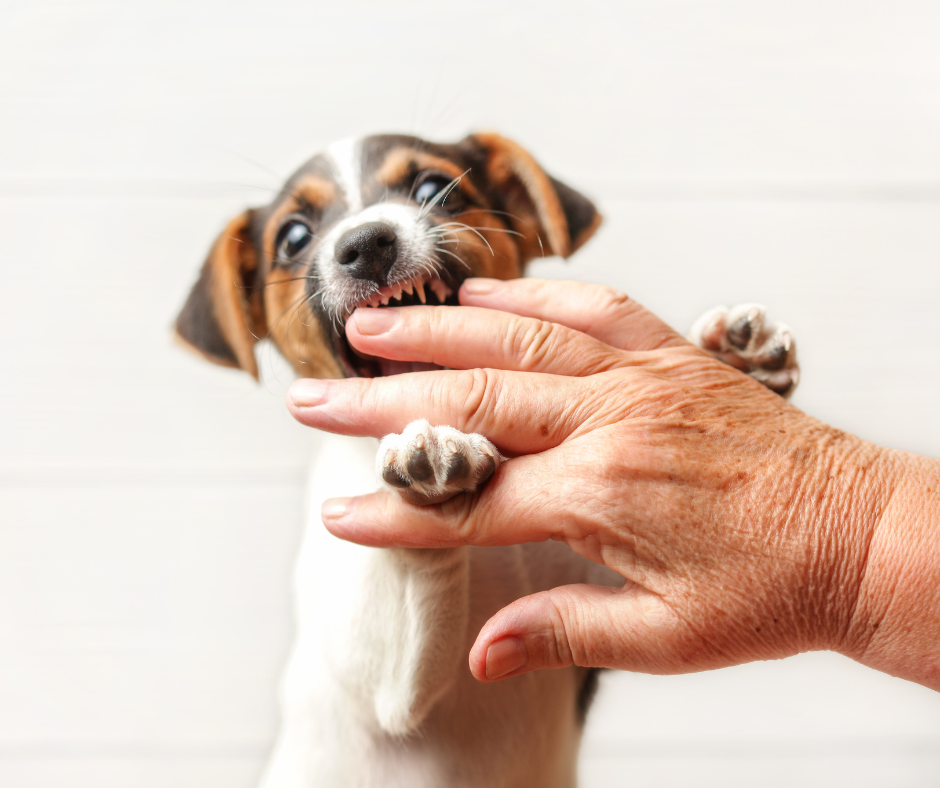
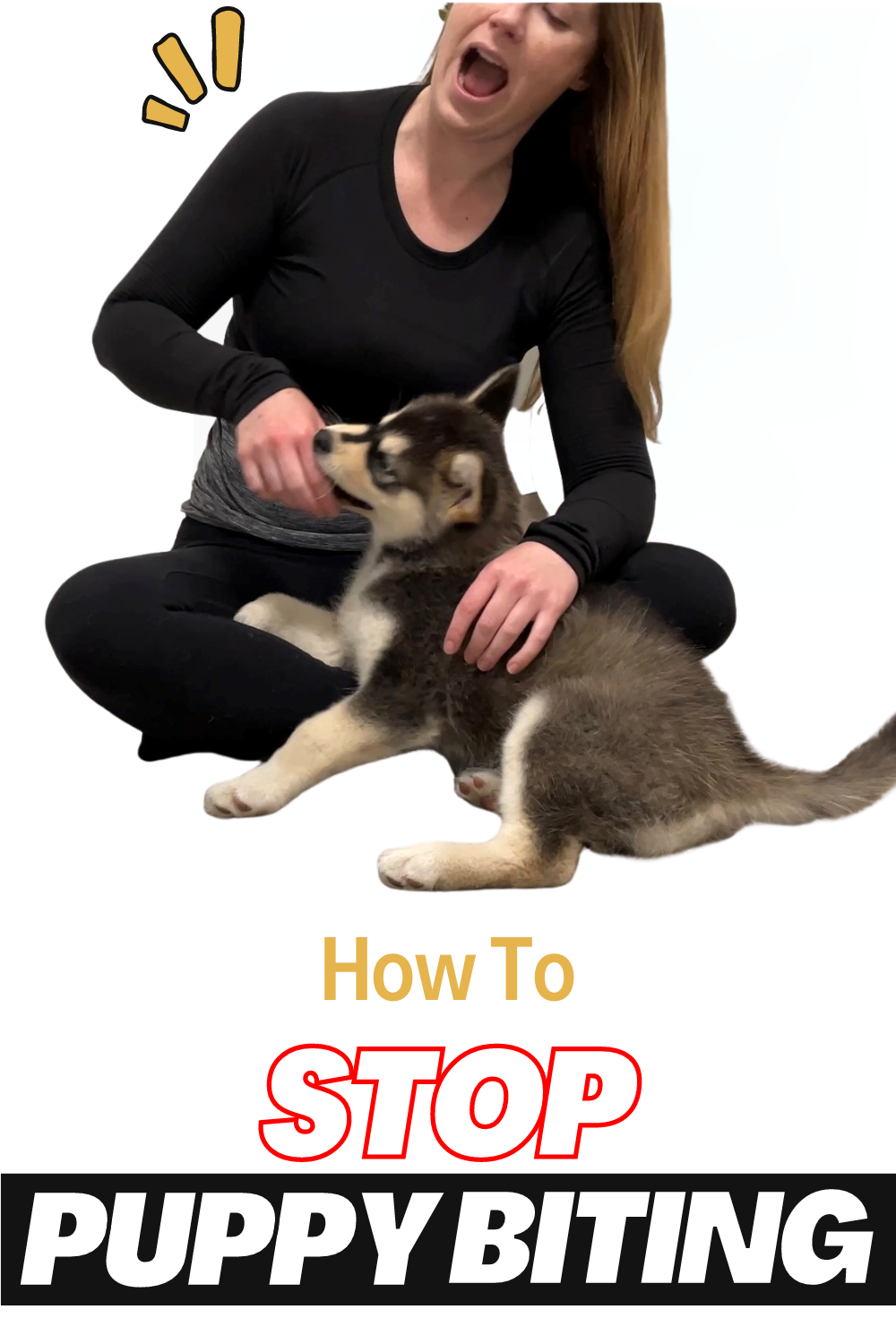
+ show Comments
- Hide Comments
add a comment